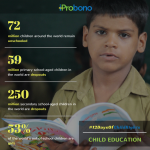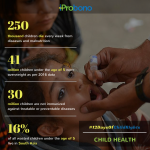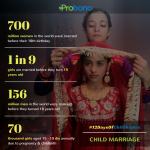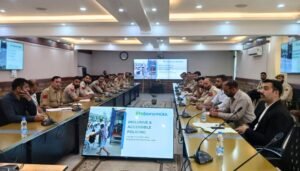
There are an estimated 2.2 billion children in the world, our future generation; but their future doesn’t seem to look too bright. Around the world, millions of children are being denied basic rights and subjected to various kinds of physical and emotional abuse – because of their place of birth; because of their race, ethnicity or gender; or because they have a disability or live in poverty.
With an aim to protect children’s rights and spread awareness about the state of children across the world, iProbono launched its own ‘12 Days of Child Rights’ social media campaign on June 1 which is observed as the ‘International Children’s Day’ in many places around the world. The campaign featured various child rights related statistics and data, collated from reliable websites and shared in the form of info-graphics.
Here’s a reflection of the 12 Days of Child Rights (Click on the image to view the social media campaign):
Day 1: Child education
Education remains an inaccessible right for millions of children worldwide, notably because of persisting inequality and marginalisation. Most children from disadvantaged backgrounds are required to abandon their education due to health conditions or in order to work and support the family. As per data, an estimated 250 million secondary school-aged children in the world are dropouts.
It is a sad reality that access to proper healthcare, which is a fundamental human right, is still out of reach for millions of children worldwide. Newborns and children are particularly vulnerable to malnutrition and infectious diseases, many of which can be effectively prevented or treated by timely intervention. According to data, an estimated 250 thousand children die every week from diseases and malnutrition.
Day 3: C hildren living with disabilities
hildren living with disabilities
Children with disabilities are one of the most vulnerable, marginalised and excluded groups in society. They face constant discrimination in the form of negative attitudes, lack of adequate policies and legislation, lack of provision of services such as healthcare, rehabilitation, and education. Statistics show that 90% of children living with disabilities in low income countries don’t attend school.
Day 4: Children affected by conflict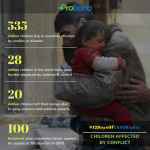
During conflict, the rights of children are violated on a massive scale. They are confronted with physical harm, constant fear, and loss of their families. They are left vulnerable to many other dangers, from disease and malnutrition to violence and exploitation. An estimated 28 million children in the world have been forcibly displaced by violence and conflict, and about 20 million children left their homes due to gang violence and extreme poverty.
There are a number of reasons leading to children becoming homeless such as extreme poverty, war, natural disaster, community violence, and abuse within family. Children who lack a stable home are left vulnerable, and are challenged by unpredictability, insecurity, and chaos. There are an estimated 100 million homeless children around the world.
Children go missing because of a number of reasons including; abduction or kidnapping by family members and non-family members; children who run away from their home or forced to run away by family and surrounding circumstances; or children who have simply misunderstood directions, miscommunicated their plans or are lost. Statistics show 40% of abducted children are murdered or never recovered.
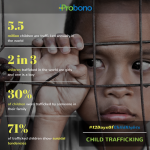 Day 7: Child trafficking
Day 7: Child trafficking
Trafficked children experience multiple forms of abuse and neglect. Children are trafficked for various reasons like forced labour, domestic work, to work as child soldiers, as camel jockeys, for begging, to work on construction sites but mostly children are trafficked for sexual exploitation. It’s disturbing to note that 30% of children were trafficked by someone in their family.
Child sexual abuse is grossly under reported and both boys and girls are equally susceptible to abuse. In majority cases, offenders are more likely to be someone known to the victim rather than strangers. As per data, an estimated 230 million children are sexually abused worldwide.
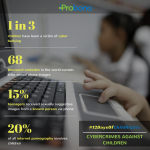 Day 9: Cybercrimes against children
Day 9: Cybercrimes against children
Statistics indicate that internet crimes against children are increasing. Every year thousands of children become victims of various types of cybercrime such as creation and distribution of child pornography, commercial sexual exploitation of children, cyber-enticement, solicitation and grooming, cyber bullying, cyber harassment, and cyber stalking. There are around 68 thousand websites in the world that contain child sexual abuse images and content, and a disturbing 20% of all internet pornography involves children.
Day 10: Children affected by poverty 
Children living in poverty are deprived of basic necessities of life, such as food, clean water, shelter or healthcare. These children spend their formative years struggling to survive. Poverty limits their opportunities for education, puts them at risk for health problems and increases the likelihood that they’ll be subjected to child labour or even early marriage. It’s sad to note that an estimated 25 thousand children die every day due to poverty.
Marriage before the age of 18 is a fundamental violation of human rights. The practice of child marriage is widespread and can lead to a lifetime of disadvantage and deprivation. It violates a child’s rights to health, education, and opportunity. An estimated 70 thousand girls aged 15 to 19 die annually due to pregnancy and child birth. ‘A Comment on Child Marriage in Pakistan’ is a piece written by iProbono’s Pakistan team which covers various traditional and cultural practices of child marriage prevalent in the country.
An estimated 168 million children around the world remain trapped in child labour, many of them work full-time, robbing them of their childhood. More than half of them work in hazardous environments, subject to slavery, or other forms of forced labour, that may compromise their physical, mental, social and educational development.
On June 12, the ‘World Day Against Child Labour’ day, we concluded our 12 Days Of Child Rights campaign. The campaign reflects that despite the progress made in recent years, the situation faced by the children of our world is still desperate and needs more attention and effort.
iProbono works extensively to provide access to justice to child sexual abuse survivors from disadvantaged sections of India. Over the past two years, iProbono has represented 28 survivors of child sexual abuse at the Delhi High Court with some notable achievements. This year, iProbono has made a conscious effort to expand its child rights work and reach out to more children in need of quality legal representation. To enable our vision, we seek your support and contribution to our crowdfunding campaign. Help us amplify our work by donating here.
Swati Jain – Senior Communications and Advocacy Officer, iProbono




